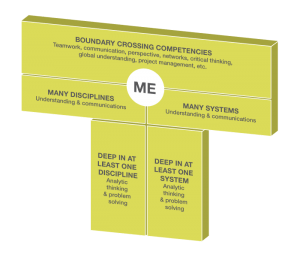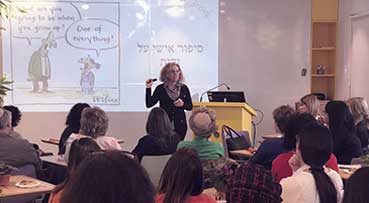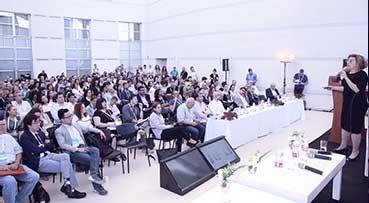This post is about giving yourself the gift of an updated perspective on your career situation. Then, when the day arrives when you discover (worse case) or decide (best case) that the path you were on has reached its end, you will be better prepared to do something about it.
Somewhere around the age of 45 give or take, this conversation emerges. Almost everyone has it with someone: a spouse, a friend, a confidant, a coach. You look back over a couple of decades of your career. You look ahead and realize that, at least in terms of numbers, you’re are still a long way from retirement. And you take stock.
You’ve read the articles. At your age, you’re should consider yourself lucky to have a job, especially if it is comfortable and familiar. For decades you’ve built a career based on risk taking and creativity. When one door closed, you found another way in. You climbed, built, grew. You never wanted the comfortable and familiar. For decades you’ve broadened and deepened your knowledge and experience – in your field, in your organization. You’ve made a name for yourself, you have networks, mostly within your ecosystem, but you have them as you have standing and influence. So why are you having these thoughts, this conversation, about the next phase in your career???
How’s your autopilot?
One of the reasons might be the sense of complacency, which arises after many years of a challenging climb up the professional and/or corporate ladder. After a number of decades, we feel we “have arrived”, we feel we have rightfully earned our position and feeling of accomplishment. However, if we’re doing more or less the same things for many years, it is possible we are now on “auto-pilot” and the danger is that the direction in which we are flying is no longer the right one. And in this business you probably know that “comfortable and familiar” is the beginning of the end…
But even if you are not complacent, the mere fact that you are asking yourself questions about the next phase of your career means it is time to take a look at it, internally and externally. Internally – that is the space where you evaluate your own wishes and values. You might begin with a list of what you love or dislike about your job. You may also want to check if it still makes you feel challenged or maybe you are simply coasting. This is the time to ask yourself also what dreams you have put in the back seat for many years, maybe now is the time to divert your attention to these?
Consider the flashing yellow light
And externally – this is where you evaluate signs from your environment, you managers, peers, customers. There are clear signs about your career in the form of lack of promotion, annual evaluations and performance indicators. There could also be clear signs that have nothing to do with your personal performance, signs about the organization or business you are in, such as market issues, technology risks or financial challenges. But there are also difficult questions to be asked about your own professional capability: do people still come to you to consult? To buy? Does your perspective still count?
The Stanford Distinguished Careers Institute offers a one-year program for established leaders from all walks of life who seek to transform themselves for roles with social impact at the local, national, and global levels. Dr. Pizzo, the Founding Director, addresses these signs around us, which indicate the possibility we need to consider changing the path for our career. According to Dr. Pizzo, if we don’t actively seek these signs, we will not see the flashing yellow light and find ourselves in the middle of a change which was forced upon us.
Not if but when
If you are asking yourself questions about your career, you already know that sometime in the next few years you will find yourself on one of two paths. Either you will find a new route in the organization or externally, or the organization will push you out to find that new path. We all reach that point, the point where we have to make a change. A change can be the end of the road in a role, an organization, maybe even a profession. It’s not about whether this will happen, it’s about when. And the only question here really is whether you want to be one of those who knew this day will come and prepared for it, or belong to the group that didn’t see it coming and discovered they are out in the cold.
One possible way to prepare yourself for that day is to imagine firing yourself once a year. And then evaluate –
how prepared you are for the next phase in your career:

What does your career T look like? This is a really good question to ask yourself after a decade or two of work experience. The idea of a T-shaped career was first formulated by David Guest in the early 90’s in an article titled “The hunt is on for the Renaissance Man of computing”. The idea is simple – the vertical line represents the depth of your experience and the horizontal its breadth. Or in other words, how much knowledge and skills do you have and in what disciplines, systems and cultures. It looks something like this:
Do you maintain a network outside the organization? The breadth and depth of your network outside, those people you will reach out to the day you decide to evaluate a new career path, all those depend on how active you are in maintaining your network. Many of us boast great networks inside our ecosystem. These are the networks which brought us this far. But if you fire yourself you might discover that your strong network remained behind, in your old world. You might discover that on the outside you don’t have what you need to help you find the next phase.
So fire yourself and prepare a list of the first ~20 people you would call to tell them you’re making a career change. When was the last time you contacted them? A real connection, a Happy New Year text message does not count. Contact is a conversation over coffee or lunch, or even a phone call. Do you know what is going on with them? Do they know what is going on with you?
Who will speak For You when the day comes? In an executive education program at Darden I was first introduced to this concept “Speaking For”. Who, from your long career, will speak for you, recommend, help you in your new beginning? Make another list, of those ~20 people in your career, who can help you move to the next level. Then ask yourself the same questions.
Do you have an updated Resume? Yes, write one, and update it annually. Updating does not mean adding your latest job. Updating means re-reading your CV from the beginning. If you have two decades of career information, then those first two paragraphs about your student job in college are no longer relevant. And more importantly, read your CV with the eyes of the hiring manager for that next job you want. Do you have the relevant experience? Does your resume clearly represent your relevant experience or is it buried under lengthy titles and role descriptions?
How up to date is your social profile? Now that you have a resume, update your social profiles accordingly. Make sure your LinkedIn page includes the experience you defined as relevant, that it includes the keywords necessary for the next phase of your career. And one more thing, now that you have your network and your “speaking for” people, evaluate your social media networks. Are they up to date? Do they fit this day, the day you fired yourself? Are they broad enough? Deep enough? Will they help you get to that next phase?
This is not about growing your social media networks just for the sake of numbers. The idea here is that you ask yourself who is part of your network and invest the time to ensure your network is updated and includes the right contacts. Give it some thought, you might discover you need to get involved in a professional community, in forums, attend conferences, maybe speak in them. Or you might discover you have to fill in a gap or familiarize yourself in a complementary area of expertise.
So now you have a few good reasons to explore firing yourself. Give yourself the gift of an updated perspective on your career situation. You don’t have to quit your job to start thinking about the rest of your career. And the rest of your career does not have to begin tomorrow or have to be outside the organization. But you have to be prepared to see reality and deal with it. Dealing with reality, as opposed to ignoring it, is a big step in the right direction. Then, when the day arrives when you discover (worse case) or decide (best case) that the path you were on has reached its end, you will be better prepared to do something about it.

![large-AX1A2125-2[1] large-AX1A2125-2[1]](https://dev.niritcohen.com/wp-content/uploads/elementor/thumbs/large-AX1A2125-21-pnzedcs72atx5aeurqytqdiihxixlq02re9mlz805s.jpg)






